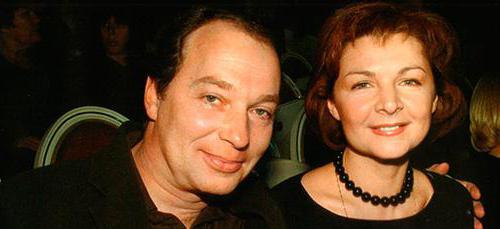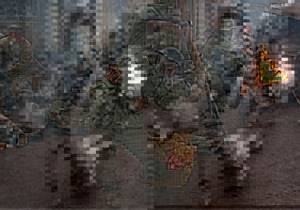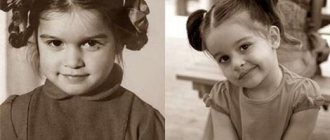Family
- Wife - Lika Nifontova;
- The first daughter is actress Alexandra Sergeevna Ursulyak (from actress Galina Nadirli).
- The second daughter is Alexandra Daria Sergeevna Ursulyak from her second marriage to Lika Nifontova.
Awards
Film Festival "Kinotavr":
- Prize for debut (1993) - “Russian Ragtime”;
- Prize "Diamond Rose" (1998) - "Essay for Victory Day."
Film Award "Nika":
- Special Prize (2008) - “Liquidation”;
- Special prize “For creative achievements in the art of television cinematography” (2012) - “Life and Fate”.
Other awards and prizes:
- 2004 — Miron Chernenko Prize from the Guild of Film Scholars and Film Critics of Russia for the masterly translation of Yuri Trifonov’s prose into the language of cinema.
- 2008 — Award of the Federation of Jewish Communities of Russia “Person of the Year”.
- 2008 — FSB Award in the category “Cinema and Television Films” for the feature film “Liquidation.”
- 2009 - FSB Award in the category “Cinema and Television Films” for the feature television series “Isaev”.
- 2015 - Prize of the Government of the Russian Federation in the field of culture - for the creation of the television feature film “Life and Fate”.
- 2016 - State [en] Prize of the Russian Federation in the field of literature and art for 2015 - for contribution to the development of domestic cinema.
Childhood and youth
Sergei Ursulyak was born in June 1958 in Khabarovsk in the family of a military man and a teacher. Due to the service of his father - a graduate of the Sevastopol Naval School and captain of the second rank in the naval forces - the family often changed cities and places of residence. Sergei Ursulyak spent his childhood years in Magadan. Sergei Ursulyak is Russian by nationality, but Jewish blood also flows in his veins. The director’s grandmother, a native of Ukraine, visited the Jewish ghetto during the German occupation.
As a child, Sergei Vladimirovich became interested in reading, preferring historical and adventure literature. Ursulyak was able to join the world of theater and art during the summer holidays, which he spent with his grandmother in the Moscow region. With his grandmother and mother, who loved theatrical life, Sergei Ursulyak visited the Moscow Philharmonic and theaters, where he admired the action on stage.
From a young age, Sergei considered Eldar Ryazanov, a living classic of Soviet directing, whose every work on the screen was amazingly verified and impeccable, to be his standard and unquestioned authority. Watching the master’s films, the young man dreamed of being on the other side of the screen.
After graduating from high school, Ursulyak set off to conquer the capital. In his youth, on his first attempt he entered the theater school named after B. Shchukin and entered the faculty of Evgeniy Rubenovich Simonov. After receiving his diploma, Sergei was accepted into the Satyricon troupe.
New in blogs
The opinion of the famous film director Sergei Ursulyak about life in the Soviet Union and the problems of modern Russia. What is the most important thing, according to the director, that the Russian people need? What changes are we on the verge of?
Sergey Ursulyak. Photo taken from open sources.
Good health to all, dear readers and subscribers of my channel!
A few words about the film director. Sergei Vladimirovich Ursulyak (born in 1958) is a Russian film director, screenwriter and producer; He is a laureate of the State Prize of Russia (2016). The greatest fame, in my opinion, was brought to Sergei Ursulyak by the serial film “Liquidation” (2007). Film critics and viewers agreed that “Liquidation” is worthy to stand among such Soviet film hits as “The Meeting Place Cannot Be Changed” and “Seventeen Moments of Spring.”
Ursulyak also directed such films as: “Russian Ragtime” (1993), “Essay for Victory Day” (1998), “Isaev” (2008), “Quiet Don” (2015) and “Bad Weather” (2018) and others.
In his interviews, Sergei Ursulyak always clearly and openly expresses his civic position on many pressing issues of life, both in the Soviet Union and in modern Russia.
Read, think and draw the right conclusions.
- About life in the USSR:
“...I yearn for a country in which everyone felt like they belonged, everyone was equal to everyone, and the aspirations of one were transmitted to another. So it was and so it should be...”
“..The world was joyful, we were not afraid of anything - neither the street, nor late gatherings, nor adults, nor rain...”
- About goals. which the Soviet people had:
“...There was a common goal and everyone had a goal. This goal was beautiful and noble: to survive the war, restore the economy, create something. And most importantly, there was faith that tomorrow will be better than yesterday. And no one needed to be forced to be patient..."
- On why, according to Ursulyak, the audience loved the film “Liquidation” so much:
“...I think “Liquidation” attracted them not with its detective story, but with the atmosphere of a lost paradise, where ordinary people in difficult times existed in the categories of normality and justice. We are unconsciously drawn to the past - there it is clear who is a friend and who is an enemy, there are not nominal, but genuine concepts: loyalty, love, friendship, community, courtyard, favorite music and songs ... "
- About life in modern capitalist Russia:
“..Morals are hardening and intolerance is growing stronger. Because people do not see prospects and live without a clear goal. Most importantly, there is no big positive task. They don't understand what and where we are going. Hence the withdrawal into oneself, the complete absence of human connections, aggression...”
- About our foreign policy, which leads to self-isolation of Russia and the fact that Russia has no friends in the world:
“..As it turned out, we are alone on this planet, everyone wishes us harm, we are not friends with anyone. Showing Kuzka’s mother to everyone is a task, but not a positive one. It leads into emptiness...Putin reflects the general mood. We all want to show both each other and the world this Kuzka’s mother. For some reason we don’t want to show anything else...”
- Ursulyak’s opinion that Russia is on the verge of big changes:
“..I think that we are on the threshold of big changes, because it is obvious to me that we are at some kind of dead end in all respects - internal, economic, development. There is a crisis of confidence, again, in relation to the authorities...”
- About the fact that the Russian people need a common goal and a sense of justice:
“...It is extremely important for a person of Russian mentality and culture to have a clear purpose of existence and a sense of justice. Today they are not there, and it seems to me that this is where the discord comes from. We need common hope, faith, and the stupid phrase “tomorrow will be better than yesterday” is important for a person. We are always ready to live badly, but not so that Vasya Pupkin lives well, but for the sake of the common good. And I, like everyone else, miss the community that binds the country not in words, but in deeds. The feeling that I’m not tending my own garden, but that I’m doing a great common cause...”
(All quotes are taken from interviews with Sergei Ursulyak for the publication “Sobesednik,ru” (May 2018), “Arguments and Facts” (2016), the newspaper “Culture” (11/30/2017) and the publication “MKRU” (2018))
Man of the Day: Sergei Ursulyak
On June 10, 1958, director Sergei Ursulyak was born.
Private bussiness
Sergei Vladimirovich Ursulyak (63 years old) was born in Petropavlovsk-Kamchatsky (according to other sources, in Khabarovsk), in the family of a naval officer and a teacher. Due to the service of his father, a captain of the second rank in the Navy, the family moved often. Sergei spent his childhood in Magadan.
The social circle of the parents of the future director, according to him, consisted of the Moscow intelligentsia and the children of the repressed.
After graduating from school, Ursulyak “very easily and brilliantly” entered the Shchukin School in Moscow, but his studies were not easy - for the first two years, Sergei was on the verge of relegation.
In 1979 he graduated from the acting department of the university (workshop of Evgeny Simonov), and a few months later he was accepted into the Leningrad State Theater of Miniatures by Arkady Raikin. Life in Leningrad was difficult - the actor went there alone, leaving his then-wife, actress Galina Nadirli in Moscow. For two years he lived with the actor and future TV presenter Pavel Lyubimtsev. In 1982, the theater of miniatures moved to Moscow, and since 1987 it began to bear the name “Satyricon”. In the same year, the theater was headed by Konstantin Raikin, with whom Ursulyak was in conflict over artistic issues.
Sergei Ursulyak played in Satyricon until 1991.
Twice he tried unsuccessfully to enter the directing department of VGIK, and in 1990 he was enrolled in the higher courses for directors and screenwriters in the workshop of Vladimir Motyl. Ursulyak’s graduation work was the film “Russian Ragtime,” filmed in 1993. The film received two awards at the Kinotavr Film Festival and the Nika Award for best music.
In 1995, Ursulyak directed the film “Summer People” based on Maxim Gorky’s play “Summer Residents”. In 1997, his “Essay for Victory Day” was published, where Oleg Efremov played his last role. In 2004, the director filmed “The Long Farewell” based on the story of the same name by Yuri Trifonov.
Afterwards, Ursulyak switched to historical series: in 2007, his “Liquidation” was released, a serial detective story about the fight against crime in Odessa after the Great Patriotic War.
In 2009, the 16-episode film “Isaev” was released based on the works of Yulian Semenov about the intelligence officer Maxim Isaev.
In 2012, Ursulyak’s television series “Life and Fate” was shown, based on the novel of the same name by Vasily Grossman.
In 2015, the premiere of Ursulyak’s serial film “Quiet Don” took place on “Russia 1”. The film received the Golden Eagle award as the best series of the year.
In the fall of 2021, a new series by Sergei Ursulyak, “The Diamond Chariot,” based on the novel of the same name by Boris Akunin, should be released.
Sergey Ursulyak
kremlin.ru
What is he famous for?
A well-known director who has been filming historical television series since the mid-2000s. The most famous of them are a detective story about crime in post-war Odessa “Liquidation”; the series “Life and Fate” based on the novel of the same name by Vasily Grossman and the serial film “Quiet Don”.
Director of the films “Russian Ragtime”, “Essay for Victory Day”, “The Long Farewell”.
What you need to know
In addition to working in films, Ursulyak was involved in several television projects. From 1995 to 2001, he was the director of the Dog Show program on NTV. In 1999-2000 he was the director of the documentary series “Recent History” with Evgeny Kiselev.
From 2002 to 2005, he was the author and presenter of the series of documentary programs “The Motley Ribbon.” The program was dedicated to the fates of famous creative people.
Direct speech
About taboo topics (“Rossiyskaya Gazeta”, October 2016):
- There are topics that fall under the Criminal Code - they are prohibited, yes. As for the rest... Let's say, should we know the truth about Panfilov's heroes? There is serious debate about this now. Is the one who says that they did not exist encroaching on the sacred, on our history, or not? It seems to me that this problem has been made up out of thin air. There is a legend about twenty-eight Panfilov heroes, and let it remain. But there are historical facts, there are real events in the Moscow region in the fall of 1941, and this is a different topic of conversation, a different reality.
— So you think that these realities can exist in parallel? Someone needs a historical myth, someone needs facts, and let everyone get theirs?
- Absolutely right. And the one who unearths probable (or incredible) facts, for example about the siege of Leningrad, does not encroach on our Victory, nor on sacrifices, nor on suffering, this is another line of life, a line of science. Now these conversations, let’s say, are not encouraged. But you can’t forbid people to think differently. Another thing: when talking about such things, you need to have a special subtlety of soul and not do something that offends the feelings of other people.
About Stalin (“Arguments and Facts”, August 2016): “People are returning to the name of Stalin again not because they miss repressions - no, they miss a fair structure of the world. And since Stalin is a long time ago and far away, and the horrors of that time are no longer perceived so acutely, they get the feeling that if a man comes in boots and with a pipe, he will be able to restore order and make the world more just.
The topic of Stalin and Stalinism is also being discussed because, due to various circumstances, we cannot seriously deal with the present day. When people understand that they cannot influence anything, some turn to God, and others to Stalin as a kind of symbol of order and stern equality.”
About your purpose (“Meduza”, November 2015):
“I know for sure that I can’t be interesting to those who don’t understand the life of my homeland.” Let me give you an example: the film “Liquidation,” which everyone in Russia knows, was not bought by any foreign country except Israel.
— Or maybe it was a producer’s mistake: they didn’t sell well?
- Not at all. It’s just that “Liquidation” is a story that is understandable only to those who lived or are living here, and there is nothing else there. There is no detective story that could be of interest to a resident of France or England. <…> I’m not saying this out of resentment, I’m not trying to get out of it, I just clearly understand within myself that by the way I’m telling the story, by my gut, I don’t go beyond “here.” And my departure to television is explained precisely by this: I want to be understood here, I want to tell my simple stories here, in my own language.
About political activity (ibid.): “After perestroika, political and civic activity there was only one moment in my life when I would like to go to a rally: in December 2011. To Bolotnaya. But I was in Yaroslavl then and didn’t go. Then it became a sport, some kind of show with relevant people, many of whom I categorically dislike. And I thought that this story is not mine.
Then I went to a rally one more time - the day after Nemtsov’s murder. I just happened to be in Moscow, although the filming of “Quiet Don” was already in full swing. I went because I understand that there are some blatant things that should unite us - regardless of our attitude to certain ideas or to certain individuals. But this is actually where my political activity is limited.
You see, I believe that today the only possibility of life - such a life that does not lie to itself - is to limit the space around you and influence it in the direction in which you would like to change everything around you. Inside your front garden you need to try, organize, take care of and protect it.”
4 facts about Sergei Ursulyak
- The director's father was from Ukraine, and his grandmother was in a Jewish ghetto during the German occupation.
- The film “Russian Ragtime” was based on a real incident with director Roman Kozak, critic Arkady Tsimbler and presenter Mikhail Shirvindt. On November 7, 1977, on the day of the 60th anniversary of the revolution, drunk student friends removed the red flag from the building of the Architectural Institute. Young people were expelled from universities and expelled from the Komsomol.
- Ursulyak wrote scripts for his own films “The Summer People”, “Poirot’s Failure”, “The Long Goodbye”, “Quiet Don”. Many of his works were awarded awards and prizes: festivals “Kinotavr” and “Window to Europe”, statuettes “Golden Aries”, “Nika”, “Golden Eagle” and others. At the end of 2008, the series “Liquidation” received a whole bunch of awards from the FSB.
- The director is surrounded by actresses not only at work, but also at home. His wife is People's Artist of Russia Lika Nifontova. She serves in Satyricon, and has also played small roles in almost all of her husband’s films and TV series. The eldest daughter (from her marriage to Galina Nadirli) is an actress of the Moscow Pushkin Drama Theater Alexandra Ursulyak (among her film works are “The Girl with a Braid”, “The Time of the First”). The director's youngest daughter is Satyricon actress Daria Ursulyak. In “Quiet Don” she played the legal wife of Grigory Melekhov.
Materials about Sergei Ursulyak:
Biographical information RIA Novosti
Biography 24SMI
Article about the director on 7days.ru
Help on Wikipedia
Ursulyak’s interview with the “Culture” channel
Sergey Ursulyak: biography, personal life
Our hero’s first wife was his classmate Galina Nadirli. In February 1983, the couple had a tiny daughter. The baby was named Alexandra. The new father himself swaddled, bathed and put his daughter to bed. But the happy family life did not last long.

Sergei Ursulyak, a biography whose personal life interests many, left the family in 1986. He has a new girlfriend - actress Lika (Liana) Nifontova. In April 1989, she gave birth to the director’s daughter, Dasha.
Sergei Vladimirovich’s children from his first and second marriages are on good terms. Sasha and Dasha see each other often and support each other morally. They are both actresses.

The eldest daughter, Alexandra, has already given him two charming granddaughters - Anechka (born in 2006) and Nastenka (born in 2008). As for Dasha, she recently married actor Konstantin Beloshapka.
Sergei Ursulyak: first roles in the theater
After graduating from high school, Sergei Ursulyak went to Moscow, where he entered the Shchukin Higher Theater School.
There he successfully completed his studies, graduating from the acting department (E. Simonov’s workshop) in 1979. After this, the young man was accepted into the troupe of the Satyricon Theater, where he worked for eleven long years. In this institution, he played quite extraordinary and noticeable roles, the largest of which was the role of Chatsky in the play “Woe from Wit.” Despite a fairly successful acting career, Ursulyak dreamed of realizing himself in a slightly different direction - he wanted to become a director and make films himself. Twice Sergei entered VGIK to study at the directing department, and both times he failed the exams. Then he decided to take a different path and in 1990 he was enrolled in higher directing courses in the workshop of Vladimir Motyl. There Ursulyak received basic knowledge of the profession that interested him so much. The graduate’s graduation work was his first film, “Russian Ragtime,” created in 1993.
Childhood
On June 10, 1958, the family of a serviceman from Khabarovsk, Vladimir Konstantinovich Ursulyak, and his wife, a teacher, grew by one person - their son Seryozha. The boy's father was a graduate of the Sevastopol Naval School, but due to the nature of his service he constantly moved from unit to unit. With the birth of their son, the family was able to “settle” in one place, the city of Magadan.
Since childhood, Seryozha was attracted to books : he read adventure and historical literature. The boy always spent his summer holidays with his grandmother in the Moscow region, who was the first to open the world of theater to him, regularly attending capital productions with her grandson. Sergei’s mother was also a theater fan and enthusiastically told her son about the fates of famous actors, and also introduced him to modern and classic plays by Soviet and foreign authors. Probably, all of this together shaped the boy’s future acting and directing vocation.
Life and destiny

Ursulyak's 3 coolest films
«-»
Life and destiny
Information
Rating: 7.999 | IMDb: 7.70
| Year | 2012 (season 1) |
| A country | Russia |
| Director | Sergey Ursulyak |
| Scenario | Eduard Volodarsky, Vasily Grossman |
| Producer | Anton Zlatopolsky, Maria Ushakova, Evgeny Popov |
| Operator | Mikhail Suslov |
| Composer | Vasily Tonkovidov |
| Khdozhnik | Oleg Ukhov, Alim Matveychuk |
| Genre | Drama, military |
| Premiere (RF) | October 14, 2012 |
| DVD release | November 15, 2012, “CP Distribution” |
| Time | 40 min. (465 min.) |
Starring: Sergey Makovetsky, Anna Mikhalkova, Alexander Nikolsky, Alexander Baluev, Anton Kuznetsov, Lika Nifontova, Nikita Tezin, Evgeny Dyatlov, Polina Agureeva, Sofya Raizman
Description
Film ranked high in the CHARTS
Defense of Stalingrad 1942-1943. The incomparable nuclear physicist must show what he is capable of. No wonder Stalin himself became interested in him. Victor is full of lists of new projects, but the authorities demand from him one invention - a new atomic bomb. If he does not carry out the instructions, he will be killed. Decent movie
The ideas of Sergei Vladimirovich Ursulyak are truly worthy of embodiment in filmography
Trailer
Summer people

10 best films by Sergei Ursulyak
«-»
Summer people
Information
Rating: 6.476 | IMDb: 6.00
| Year | 2019 |
| A country | Russia |
| Director | Sergey Ursulyak |
| Scenario | Mikhail Zhvanetsky, Sergey Ursulyak |
| Producer | Anton Zlatopolsky, Maria Ushakova |
| Operator | Mikhail Suslov, Alexander Karasev, Anatoly Simchenko |
| Composer | Vasily Tonkovidov |
| Artist | Alim Matveychuk, Vladimir Gudilin, Alexey Kamyshov |
| Installation | Margarita Smirnova, Eleonora Zelenkova |
| Genre | Comedy |
| Premiere (RF) | January 1, 2020 |
| Time | 82 min. / 01:22 |
Starring: Sergei Makovetsky, Svetlana Ryabova, Viktor Gvozditsky, Sergei Koltakov, Maria Aronova, Irina Kupchenko, Natalia Vdovina, Lika Nifontova, Vladimir Bolshov, Fyodor Dobronravov
Description
Russian film by our director and screenwriter Sergei Ursulyak
Which was filmed in 1995 based on the complete play by Maxim Gorky “Summer Residents”. A romantic story about a young nobleman Vlas, who is in love with the mistress of the estate. You couldn't find a better romance; it starts very quickly. But how strong is love in beating hearts full of feelings?
Vivid emotions reign in every frame, enjoy watching a domestic producer











